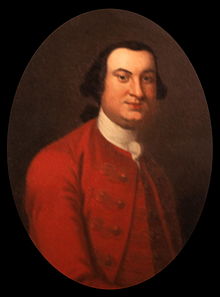
Back هنرى بوكيه ARZ Henri Bouquet German Henri Bouquet French Буке, Анри Russian Henri Bouquet Swedish
Henry Bouquet | |
|---|---|
 Portrait by John Wollaston, c. 1759 | |
| Birth name | Henri Louis Bouquet |
| Born | 1719 Rolle, Switzerland |
| Died | 2 September 1765 (aged 45–46) Pensacola, West Florida |
| Allegiance | |
| Years of service | 1736–1765 |
| Rank | Brigadier general (British Army) |
| Unit | 60th Regiment of Foot |
| Commands held | Fort Pitt |
| Battles/wars | French and Indian War |
Henry Bouquet[2] (born Henri Louis Bouquet;[1] 1719 – 2 September 1765) was a Swiss mercenary who rose to prominence in British service during the French and Indian War and Pontiac's War. He is best known for his victory over a Native American force at the Battle of Bushy Run, lifting the siege of Fort Pitt during Pontiac's War. During the conflict Bouquet gained lasting infamy in an exchange of letters with his commanding officer, Jeffery Amherst, who suggested a form of biological warfare in the use of blankets infected with smallpox which were to be distributed to Native Americans.[3] Despite this indictment historians have praised Bouquet for leading British forces in several demanding campaigns on the Western Frontier in which they "protected and rescued" settlers from increasingly frequent attacks.[4]
- ^ a b Paola Crivelli: Henri Louis Bouquet in German, French and Italian in the online Historical Dictionary of Switzerland.
- ^ Bomberger, Christian Martin. "The battle of Bushy Run: the most decisive victory in all history gained by the white man over the American Indian". Historic Pittsburgh Text Collection. University of Pittsburgh. Retrieved 17 September 2013.
- ^ Postscript of Bouquet's letter to Amherst, 13 July 1763
- ^ Kenneth Stuart, Ph.D (18 January 2018). Defenders of the Frontier: Colonel Henry Bouquet and the Officers and Men of the Royal American Regiment, 1763-1764. Heritage Books. p. 6.
© MMXXIII Rich X Search. We shall prevail. All rights reserved. Rich X Search